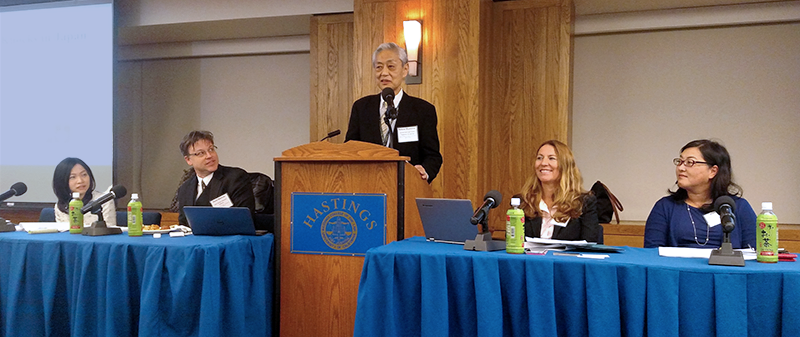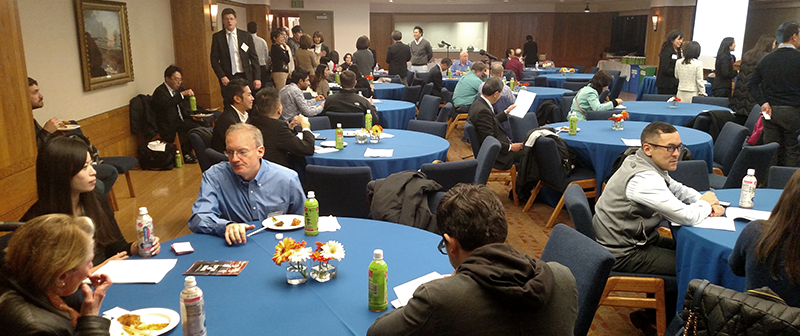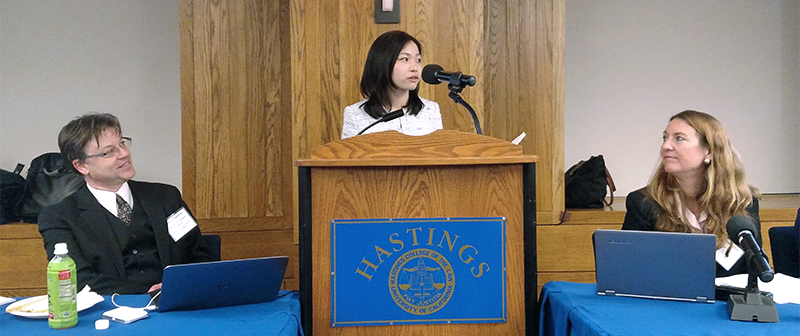[Press Release] Business & Legal Seminar Highlights Challenges and Opportunities for Businesses Entering Japan
Feb 10, 2016

San Francisco, CA, February 2, 2016 - The Japan External Trade Organization, in conjunction with UC Hastings and the Japan Society of Northern California, hosted “Opportunity Knocks in Japan: A Business and Legal Perspective.” The event saw over 80 legal professionals and business owners come together to learn about the legal and business issues foreign entities face when incorporating a business in Japan.
Several speakers presented on a variety of topics, including cultural expectations, upcoming changes to laws regarding business handling of personal information, and scheduled tax reforms for businesses providing digital services.
Elizabeth Shoemaker, a California attorney with the Law Offices of David A. Makman and former small business owner in Japan in the mid-1990s, touched upon the importance of using legal counsel when making business decisions. As a business owner in Japan, she often relied on a handshake or word of mouth agreement when entering into business contracts with clients, as is often the cultural norm; while this worked early on when the majority of her customers were close friends or acquaintances, it became problematic when a major Japanese corporation failed to pay her after a large project and she had no contract to support her claim.
Although she was able to recover the debt, Ms. Shoemaker said the experience was an eye opener.
“If the project gets big enough that the risk is too big to absorb, it’s time to start looking into hiring legal counsel,” she said. In addition to lowering the amount of risk to the business, Ms. Shoemaker noted that hiring legal counsel also allows owners to establish strong business contracts without impacting professional relationships.
“No one wants to talk about what happens if a parties’ relationship sours, especially not after working so hard to get the deal. But the potential risks and deal breakers need to be adequately addressed; if they’re not, it becomes harder to negotiate a compromise once friction sets in between the parties. Legal counsel can ask and answer these questions about liability without harming the relationship aspect of the business.”
At the end of the day, she stressed, it’s about doing the due diligence. “Hiring legal counsel at the onset of opening a business in Japan is a way of vetting clients and communicating your company is serious about doing business.”

Ms. Shoemaker was followed by a presentation from Tomohiro Ono, an Attorney at Law Admitted in Japan and Senior Associate at Yuasa & Hara. Mr. Ono, an experienced litigator in corporate transactions, intellectual property, and privacy protection, highlighted one of the largest policy changes expected to affect foreign companies entering the Japan market: planned revisions to the Act on the Protection of Personal Information (the “Act”), a law established in 2003 to ensure companies established adequate protection systems for personal information collected on individuals through business transactions.
The term ‘personal information’ as used in the Act means ‘information about a living individual which can identify the specific individual.' (Act on the Protection of Personal Information, 2003)
In the original legal text, entities that held the personal information of fewer than 5,000 individuals over a period of six months were exempted from having to take any additional precautions to protect their customer’s personal data. In the planned revisions, entities that hold the personal information for more than one individual will be required to take the necessary steps to ensure the data is properly protected.
These changes are expected to roll out by 2017, giving current business owners in Japan a window to prepare their data handling processes.

The night’s final presenter, Miho Aoki, Principal of International Tax Services at PricewaterhouseCooopers LLP, discussed some of the tax reforms expected to impact foreign business owners.
Changes include lowering the effective corporate tax rate from 32.11% to 29.74% over the next two years and reducing the tax rate relating to the income portion size-based enterprise tax from 4.8% to 3.6% beginning on or after April 1, 2016. However, Ms. Aoki noted that companies can also expect to see consumption tax increase to 10% by April 2017. Additionally, consumption taxes will also be applied to digital services; taxes will be based on the location of the recipient of those digital services.
The presentations highlighted important changes foreign companies planning to enter the Japanese market can expect to see in the near future. All presenters noted that the opportunities in Japan are numerous— but with any great business endeavor, planning and execution requires careful preparation. The event concluded with thanks to the event presenters and a period of networking and food.
Additional Reading Material:
Legal Seminar Presentation Materials (PDF) (1568KB)
Act on the Protection of Personal Information (2003) (PDF) (156KB)





